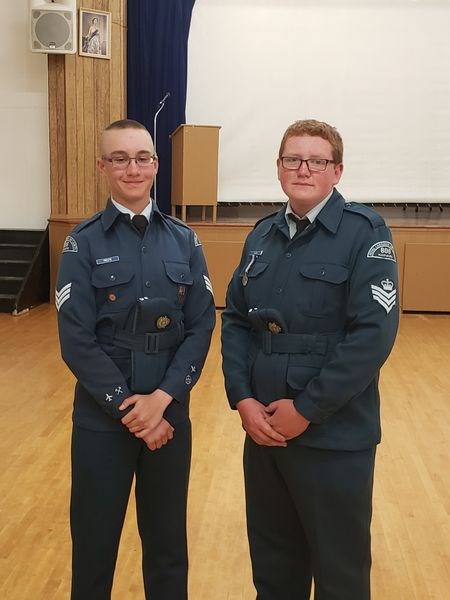The Preeceville Harvard Air Cadets squadron members were invited to register and participate in the ham operator program. Hein Bertram, who is a fully qualified operator oversaw the program.
“The goal behind the program is to have more individuals in area who are qualified to help in an emergency," stated Bertram.
Three individuals obtained their licences. Captain Troy Rogowski, Eric Prestie and Zanthany Olson all qualified and are new ham operators. Cadets Jonathon Alblas, Benjamin Larson and Jamie Katryniuk are currently preparing to write the exam.
"Radio hams services have already proved to be of immense value during and after tornadoes and other disasters, especially when inclement weather turns really nasty and power lines, telephone lines and cell phone towers blow down," said Bertram.
Bertram and Grant See were both in attendance at the cadets’ campout on May 25 to 26 showcasing radio demonstrations and providing some training on ham radios.
Air Cadets learn amateur radio
By definition, Amateur Radio is “a service of self-education, experimentation and intercommunication which is operated by an amateur.”
“The word “Amateur” is derived from the Latin word “Amare,” which means “to love,” and it is not the opposite of “professional,” stated Bertram.
With this in mind, Cadets of the 606 Harvard Air Cadet Division in Preeceville embarked on an amateur radio course during the past school year.
Their instructor is Bertram, Parklands Amateur Radio Club president, whose call sign is VE5TEN. He and Bob Drayer (VE5CQ) are two of the fourteen amateur radio examiners in the province of Saskatchewan.
Electronics, radio procedure and Canadian radio regulations are uncharted territory to most of us, and the cadets found that they were no exception.
Extremely cold weather, as well as some black ice, did some damage to the timeline, but did not deter the Officer Commanding, Captain Troy Rogowski (VE5TBR) from obtaining a very high mark. He was the first to pass his ham radio examination with a score in the nineties, and he now holds a Basic with Honours licence which allows him to communicate on all ham radio frequencies.
The Basic qualification is obtained with a score between 70 and 80 percent, and those who score 80 per cent and above received the Basic with Honours licence.
Rogowski was followed by Eric Prestie (VE5EGP) and Zanthany Olson (VE5ZDO), both of whom scored in the eighties. A number of the other cadets have expressed their intention to follow suit as soon as they have completed their school year.
“Our local ham radio population at the moment now consists of Grant See (VE5SS), Jerry Lisitza (VE5JRL), Hein Bertram (VE5TEN), Troy Rogowski (VE5TBR), Eric Prestie (VE5EGP), Bob Drayer (VE5CQ) and Zanthany Olson (VE5ZDO0),” said Bertram.
They meet “on the air” whenever they can, and will be getting together for coffee, poring over ham radio magazines, making up VHF and shortwave antennas, “and all other kinds of fun projects and activities.”
The annual Field Day event will be held on Bob Drayer’s farm on June 22 and 23.
“At this event, everyone who attends will be given a chance to communicate on the ham radio frequencies; those who are not licensed (yet) under the supervision of a licensed ham,” Bertram said.
The purpose of Field Day is to ensure that hams are ready to set up their equipment under adverse conditions on emergency power to provide the necessary communications.
Should an emergency arise, Preeceville’s radio hams are ready to provide communications.
This past weekend, Bertram and See joined the Air Cadets at Lady Lake where they set up a portable Shortwave station, cut some wire to the right length, and got onto the air. Two hams in the USA could be contacted in Morse Code, as conditions were too poor for voice communications.
“Ham radio is fun, with opportunities to make friends all over the world. You might just have a chat on Shortwave with a guy called “Juan,” to find out later that he is actually King Juan Carlos of Spain. And, as has been proved over and over again, it saves lives when disaster strikes,” concluded Bertram.



